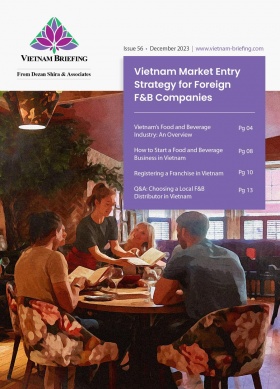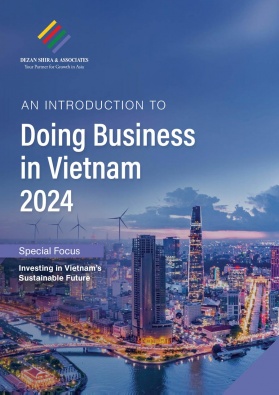How to Register a Trademark in Vietnam
Intellectual property (IP) can be among a firm’s most valuable assets. Therefore, knowing how to register for a trademark in Vietnam is crucial for protecting IP. Here’s a brief guide on registering a trademark in Vietnam.
What can be trademarked under Vietnamese law?
Trademarks are a type of intellectual property (IP) that can be represented in various forms, including logos, words, or packaging designs.
What is the trademark filing rule of Vietnam?
Vietnam has adopted a first-to-file system for the registration of trademarks, granting the trademark to the application with the earliest filing date. If there are multiple applications that meet these requirements and they have the same filing date, the trademark will only be granted to a single application – if all applicants agree.
How is a trademark filed in Vietnam?
Organizations, individuals, and foreign individuals can file trademark applications in Vietnam. They can submit directly or through a lawful representative within Vietnam.
However, foreign individuals who are not permanent residents in Vietnam and foreign organizations or individuals who do not have a production or trading establishment in Vietnam must file their applications through a lawful representative.
Foreign applicants can also obtain trademark rights in Vietnam by submitting an international application through the Madrid System (see below).
What is the validity of a Vietnam trademark registration certificate?
In Vietnam, a trademark certificate is valid for 10 years from the filing date. After the initial period has expired, the trademark owner has the option to renew the trademark certificate an unlimited number of times.
Trademark registration through the Intellectual Property Office of Vietnam (IPVN)
Key documents
- Declaration for registration according to Circular No. 01/2007/TT-BKHCN;
- Five images of the design;
- Receipts for the necessary fees and charges;
- Terms of use if the trademark is to be used for multiple organizations (for example, food safety certification);
- Explanation of the characteristics and quality of the product bearing the mark;
- Map showing the indicated territory of use (Vietnam, China, Singapore etcetera); and
- Written permission from the people’s committee of a province or city to use a geographical name or a sign indicating the geographical origin of a local specialty as part of a trademark, if applicable.
Other documents
When filing a trademark application in Vietnam, the following documents must be submitted:
- Power of attorney;
- Documents certifying the permission to use special signs (national emblems, flags, armorial bearings, abbreviated names or full names of Vietnamese state agencies/ organizations or international organizations, etc.);
- Proof of Registration Rights;
- Proof of Transferred Registration Rights; and
- Proof of Priority Right.
General requirements for IP registration applications
When submitting a trademark application in Vietnam, the following requirements apply:
- Each application can only seek a single protection title (for example, Mcdonald’s would need to submit separate applications for the golden arches and the term ‘Big Mac’).
- All documents must be in Vietnamese;
- All documents must be presented in portrait format;
- Pre-designed forms must be used;
- It must have Arabic page numbers;
- Documents must be typewritten or printed with non-fading ink to Vietnamese standards; and
- The application may be accompanied by a supporting document that is an electronic data carrier (USB, CD) of part or all of the content of the application.
Methods of filing an application
Paper filing
The applicant is permitted to submit an application either directly or via postal service to one of the IPVN’s offices. Application fees must be transferred through the postal service and the receipt must be attached to the application.
Online filing
In order to file an application online, possession of a digital certificate, a digital signature, and a registered account approved by the IPVN on their Online Application Receiving System are needed. The applicant completes an application form online, prints it out, and presents it to an IPVN office, attaches the aforementioned documents, pays the necessary fees, and will then receive an application number.
Trademark registration through the Madrid system
Individuals who are awarded certificates of registration for trademarks in Vietnam are eligible to exercise the right to international registration of those marks in accordance with the Madrid System.
The Madrid System provides a mechanism for extending the protection of trademarks beyond the domestic jurisdiction in which they are registered. This helps to make international business transactions smoother and protects intellectual property rights across national borders.
The World Intellectual Property Organization (WIPO)
The WIPO has several key responsibilities in relation to international applications. Primarily, it receives applications for international registration that are filed through the office in the country of origin. It then classifies the goods and services, processes the application, and registers the trademark on its database. It then notifies the office of origin and publishes the registered marks in a periodical gazette.
International trademark applications originating in Vietnam
An application for protection via the Madrid System must be in English or French. The applicant must submit a written declaration and an international trademark registration application.
All communications and transactions related to the application are conducted through the IPVN and the applicant pays all fees and charges directly to the IPVN.
It is then transferred to the WIPO. This should be completed within 30 days of receiving complete and valid application documents.
Reasons trademarks are often refused in Vietnam
Trademark refusal for a lack of distinctive character
A trademark is considered to lack distinctive character when it fails to perform its primary function of distinguishing the origin of goods and services offered by different entities. In the event that a trademark contains elements that are prohibited under Vietnamese law, no arguments can be made to overcome this type of refusal. However, if the trademark is not prohibited, the applicant must provide arguments and supporting evidence to demonstrate that the trademark possesses a distinctive character.
Trademark refusal due to similarity with other trademarks
A trademark may be rejected due to its similarity with other trademarks. These are referred to as cited trademarks. In such cases, the applicant needs to prove that the refused trademark is dissimilar to the cited trademark(s) and does not create any likelihood of confusion.
Responding to a refusal
Submitting a Letter of Consent (LOC)
A LOC is a written statement issued by the owner of a previously cited trademark, which explicitly confirms that the proposed trademark does not pose a risk to their existing rights. This consent permits the registration and usage of the refused trademark. The applicant of the refused trademark must present this document to the examiner for consideration.
Requesting the division of a trademark application or removing the refused goods/services
Trademarks can be refused due to being identical or similar to a previously registered trademark with respect to certain goods or services. To address this issue, it may be beneficial to request a division of the trademark application. Alternatively, it may be possible to simply remove the refused goods or services from the trademark application.
Getting assistance filing a trademark application in Vietnam
Trademarks are an incredibly important part of doing business and protecting its intellectual property can be crucial to a firm’s success. But trademark applications can be tricky in Vietnam and navigating IP law can be challenging. In this light foreign firms should, seek the support of local IP experts.
For support with trademark applications or advice on intellectual property in Vietnam, please reach out to us at vietnam@dezshira.com or visit our website www.dezshira.com.
About Us
Vietnam Briefing is published by Asia Briefing, a subsidiary of Dezan Shira & Associates. We produce material for foreign investors throughout Asia, including ASEAN, China, and India. For editorial matters, contact us here and for a complimentary subscription to our products, please click here.
Dezan Shira & Associates provide business intelligence, due diligence, legal, tax and advisory services throughout the Vietnam and the Asian region. We maintain offices in Hanoi and Ho Chi Minh City, as well as throughout China, South-East Asia, Dubai, and India. For assistance with investments into Vietnam, please contact us at vietnam@dezshira.com or visit us at www.dezshira.com.
- Previous Article Significant Cultural Events to Note When Doing Business in Vietnam
- Next Article Settling Business Disputes: Commercial Arbitration in Vietnam








